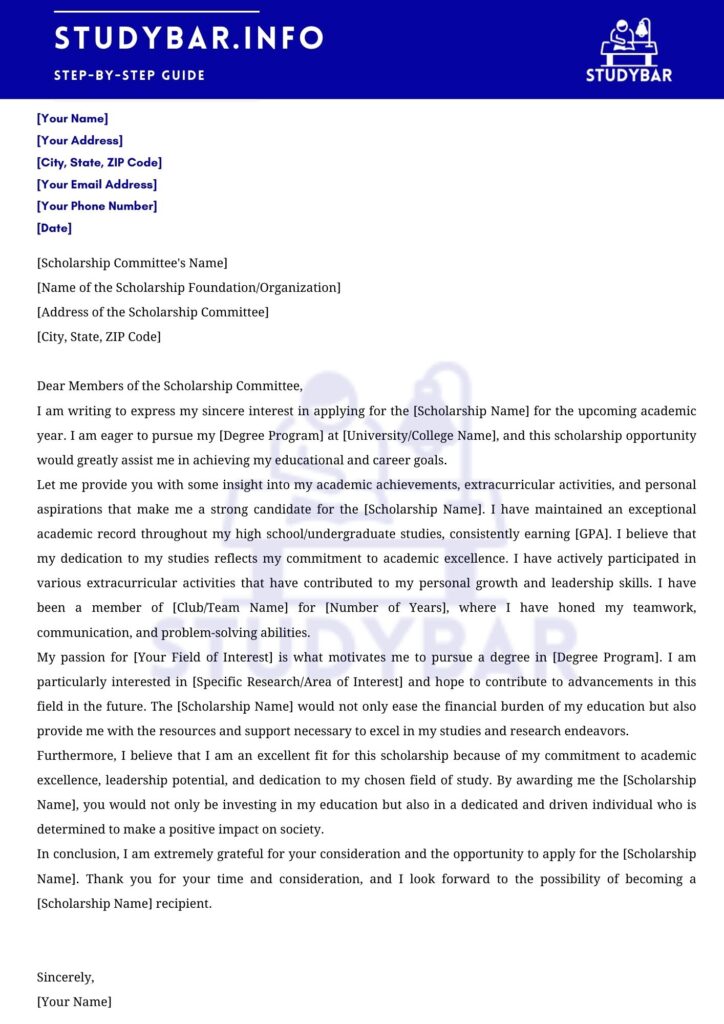
A letter of Intent for Scholarship is your opportunity to make a compelling case for why you should be awarded a scholarship. It’s a formal document that showcases your motivation, qualifications, and aspirations. In this article, we will guide you through the process of creating an impactful letter of intent that increases your chances of securing financial aid for your education.
The Purpose of a Scholarship Letter of Intent
student letter of intent for scholarship serves multiple purposes. Firstly, it introduces you to the scholarship provider, giving them a sense of who you are. It also explains why you are applying for the scholarship and how it aligns with your academic and career goals. Essentially, it’s your chance to persuade the scholarship committee that you are the right candidate for their support.
Also Check How to Write an Effective Scholarship Request Letter?
How to make letter of intent for scholarship?
Addressing the Recipient
Begin your letter by addressing it to the appropriate recipient. If you have a name, use it. If not, a generic salutation such as “To Whom It May Concern” is acceptable.
Writing a Salutation
Following the recipient’s address, include a respectful salutation, such as “Dear Scholarship Committee.”
Briefly Introducing Yourself
In the opening paragraph, briefly introduce yourself. Mention your name, current school or institution, and your intended major or field of study.
Expressing Your Motivation and Passion
Why You’re Applying for the Scholarship
Clearly state the purpose of your letter – to apply for a specific scholarship. Explain what motivates you to seek this scholarship and why it’s important for your education.
Also Check University of Cincinnati Highly-funded Scholarship 2023
Your Goals and Aspirations
Share your long-term goals and aspirations. How does this scholarship fit into your broader academic and career plans?
Highlighting Your Achievements and Qualifications
Academic Accomplishments
In the body of your letter, detail your academic achievements. Mention any awards, honors, or noteworthy grades that highlight your commitment to excellence.
Extracurricular Activities
Discuss your involvement in extracurricular activities. This can include clubs, sports, community service, or any other relevant experiences that demonstrate your well-rounded character.
Relevant Skills and Experience
Emphasize any skills or experiences that are directly related to your chosen field of study or career. Explain how these make you a strong candidate for the scholarship.
Also Check Wellington Doctoral Scholarships 2023-2024
Tailoring Your Letter to the Scholarship Provider
Researching the Scholarship
Do your homework about the scholarship provider. Understand their mission, values, and what they are looking for in a recipient.
Aligning Your Goals with the Scholarship’s Values
Demonstrate how your goals and aspirations align with the values and objectives of the scholarship provider. This shows that you’re not just seeking any scholarship but one that truly fits your vision.
How to write letter of intent for scholarship?
A scholarship letter of intent typically consists of three paragraphs:
Paragraph 1: Introduction and Motivation
- Start by explaining your interest in the scholarship.
- Highlight your motivation for pursuing higher education and the specific program you are applying for.
Paragraph 2: Achievements and Qualifications
- Discuss your academic achievements and extracurricular activities.
- Show how these experiences have prepared you for success in your chosen field.
Paragraph 3: Alignment with Scholarship Provider
- Explain how your goals align with the scholarship provider’s mission and values.
- Conclude by stating why you believe you are the ideal candidate.
Also Check Zoromia Scholarship 2023: Empowering Dreams
Dos and Don’ts for Writing a Scholarship Letter of Intent
Do: Be Authentic
Genuine passion and authenticity make your letter stand out. Be yourself and let your unique qualities shine through.
Do: Keep it Concise
Scholarship committees review numerous applications. Keep your letter concise and to the point, typically not exceeding one page.
Don’t: Use Generic Templates
Avoid using generic templates. Craft a letter that reflects your individuality and tailored interest in the scholarship.
Don’t: Overshare Personal Information
While you want to share your personal story, avoid oversharing. Focus on information relevant to your academic and career goals.
Closing the Letter
Reiterating Your Enthusiasm
End your letter by reiterating your enthusiasm for the scholarship. Make it clear that you are eager to pursue your academic dreams with their support.
Expressing Gratitude
Thank the scholarship committee for considering your application and express your gratitude for the opportunity.
Encouraging Further Contact
Invite further communication by providing your contact information or stating your willingness to provide additional information if needed.
Also Check Chalhoub Scholarship at SciencePo University
Proofreading and Editing
Before submitting your letter, proofread and edit it carefully. Typos and grammatical errors can leave a negative impression, so ensure your letter is error-free and well-polished.
example of letter of intent for scholarship
letter of intent for scholarship sample is as follow you can follow this pattern.

Conclusion
A scholarship letter of intent is your chance to showcase your passion, qualifications, and alignment with the scholarship provider’s values. Craft a personalized and authentic letter, keeping it concise and focused on your academic and career goals. With careful research, attention to detail, and a compelling narrative, you can greatly increase your chances of receiving the financial support you need to pursue your education.
FAQs
1. Can I use the same letter of intent for multiple scholarships?
It’s not recommended. Each scholarship has its unique criteria and values. Tailoring your letter to fit each scholarship provider increases your chances of success.
2. How long should a scholarship letter of intent be?
Typically, it should be one page, but it’s essential to check the specific requirements of the scholarship provider.
3. What if I don’t have many extracurricular activities to mention?
Focus on your academic achievements and relevant skills. Quality matters more than quantity.
4. Should I mention my financial need in the letter?
If financial need is a criterion for the scholarship, it’s appropriate to mention it briefly and factually.
5. Is it advisable to seek professional help in writing a scholarship letter of intent?
While you can seek guidance from teachers or mentors, the letter should genuinely represent you. Avoid using ghostwriters or paid services to write it for you.



